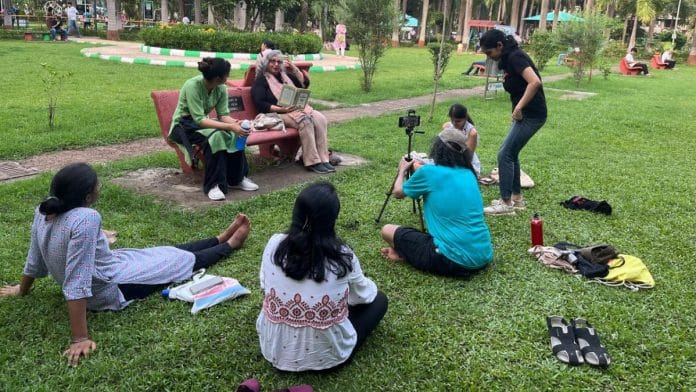Navi Mumbai: On a humid Mumbai summer evening, as many as eight people gathered at Rajiv Gandhi Udyan in Vashi, Navi Mumbai. They weren’t there for a game of cricket or a yoga session, but for the love of poetry.
One by one, poetry enthusiasts, young and old, recited the poem they had selected. From Sarojini Naidu’s Life to Ross Gay’s Sorrow Is Not My Name, the poems covered the themes of grief and sorrow.
Started by former journalist Peter Griffin in 2024, ‘Poetry in Parks’ began in solidarity with the Palestinian cause. It has since evolved into a gathering for poetry lovers.
“We love poetry. We live in a city—Navi Mumbai, which is abundantly blessed with parks, big and small. So, we thought, why not claim public space for the quiet sharing of poetry,” Griffin said. The first meet–up was on an impulse, but they found the experience meaningful and enriching, and decided to do it again. They meet every month on a Saturday evening at a different park each time.
Griffin’s inspiration was partly drawn from movements like ‘Blank Noise’ and ‘Why Loiter?’ that sought to reclaim public spaces for women.
“We insist that everyone must bring poems to share because this is meant to be participatory, not a performance—a meeting of equals, sharing love for poetry and green spaces,” Griffin said.
Attendance fluctuates between four and fourteen members, each arriving with two to three works by different poets. This is not a creative writing or a poetry criticism workshop. Griffin is clear on this. Reading their own verse is off-limits.
“Those who wish to be heard should first develop the patience to listen,” he said.
Cohen, Kolatkar, Dimitrov
For the May meet-up, Lakshmi opened the session with her reading of Andrea Cohen’s The Committee Weighs In. The short poem is a conversation between a mother and daughter that packs a powerful punch.
“It’s a little game
we play: I pretend
I’m somebody, she
pretends she isn’t dead.”
Lakshmi wore a lapel mic, and a tripod in the centre of the group captured her reading under the bright evening sky.
“Anyone can suggest a park or a theme, make suggestions, it’s a group project,” said Lakshmi, a biological sciences research scholar who is also one of the organisers. She manages scheduling and video logistics with Griffin.
At the meets, every reading is recorded with the participant’s consent, and uploaded on Instagram and YouTube. Posts and Reels offer a peek into past meet-ups. Arun Kolatkar’s The Bus, Elizabeth Barrett Browning’s A Man’s Requirements, and Alex Dimitrov’s Poem for the Reader are just a few of the selections.
The group applauded poet and author Menka Shivdasani for her stirring reading of Mamang Dai’s Gone. Currently co-chair of Asia Pacific Writers and Translators, The Seven Queens author is an old friend of Griffin, and attends Poetry in Parks whenever she finds the time.
“Poets, by nature, tend to prefer solitude and silence, but they have always found ways to connect with each other,” she said, as she produced a mosquito repellent spray from her bag and passed it around—an unspoken ritual in the open-air setting. She held out the title, The Golden Treasury Of Indo-Anglian Poetry, edited by Vinayak Krishna Gokak for the Sahitya Akademi.
“I have many old books and journals that today’s generation would have no idea about. I find poems from these to share.”
Also read: This art exhibition in a Delhi mall wants shoppers to make the right choices
This be the verse
The little group attracted attention from park goers, who gave them quizzical looks as they passed by. A few children giggled and pointed to the camera as a plane roared overhead. Shivdasani stopped reading until the roar of the plane faded away.
“Only now do I realise this park falls under the Mumbai airport flight path, we’ll have a plane passing over every four minutes,” Griffin said.
For 24-year-old aspiring writer Sona, browsing poetry on her phone offered an easy way to stay connected with the written word. She entertained the gathering with Philip Larkin’s This Be The Verse, a poem that wryly advised leaving home early—and avoiding parenthood altogether.
“I chose the piece for its comic flair and its honest reflection on how parents inevitably pass down an emotional inheritance to their children,” said Sona, who had come all the way from Sion in Mumbai.
For Priyadarshini and Shalu—two teachers and research scholars studying mathematics pedagogy—this was their first Poetry in Parks meet. They had come across it on social media.
“I loved the openness—the freedom to choose our own poems and recite at our own pace, energy and time,” said Priyadarshini.
In the fading light of day, in the backdrop of children laughing and residents on their evening stroll, everyone got a chance to read a poem before it was time to say goodbye.
“The internet is full of poetry groups, but there is a special joy in meeting personally,” Shivdasani said.
Regarding his ambition for Poetry in Parks, Griffin said that it is “well not to grow too big.” However, he hoped that others would start similar groups in their neighbourhoods and cities. “Poetry and Parks go well together.”
The reading by Lakshmi, This is What I Wanted to Sign Off With, by Alden Nowlan, murmured in the still air as the members walked away.
“You know what I’m
like when I’m sick: I’d sooner
curse than cry. And people don’t often
know what they’re saying in the end.
Or I could die in my sleep.”
(Edited by Prasanna Bachchhav)







Please send all of them to Palestine.
All of them should be deported to Palestine. They love both the land as well as the people. Should be able to live a much better life there.